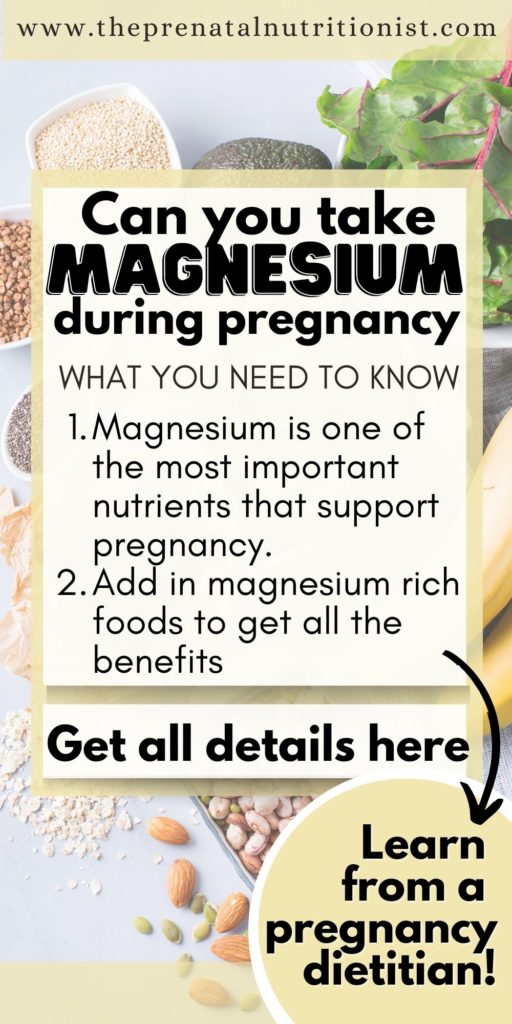
Magnesium is an essential mineral that plays a role in over 300 metabolic reactions. Research shows that magnesium supplementation or magnesium-rich foods can benefit pregnant women and baby in many ways. It’s involved in blood pressure regulation, muscle contraction, and much more. Low magnesium levels are linked to many health problems, including type 2 diabetes, migraines, and heart disease.
There are several different types of magnesium: magnesium citrate, magnesium oxide, magnesium chloride, magnesium lactate, magnesium malate, magnesium taurate, magnesium L-threonate, magnesium sulfate, magnesium glycinate, and magnesium rotate, to name a few. The main differences between each form of magnesium are their functions and how they are absorbed in the body.
Your health is likely on your mind as your pregnancy progresses. Your body is growing and changing to support your baby’s growth during pregnancy. This is why it’s so important to be mindful of your overall food intake. However, even with a balanced diet, knowing if you’re getting enough of each nutrient, like magnesium, can be challenging.
In hopes of addressing some of your concerns, I’ve written this post, which includes valuable information on magnesium and whether magnesium supplements are safe for pregnant women and a growing baby.
Can You Take Magnesium Supplements While Pregnant?
Magnesium is an essential nutrient to support a healthy pregnancy. It plays many vital roles and functions in your body. For example, magnesium can help fight common pregnancy complaints such as insomnia, headaches, and leg cramps.
Ideally, your diet and prenatal vitamin will include enough magnesium to meet your daily requirement. However, not all prenatal vitamins include magnesium. Check your supplement facts label. (Here are some tips on what to look for in prenatal vitamins!)
However, extra magnesium may be helpful if you suffer from headaches, constipation, leg cramps, or insomnia. Or if your lab tests indicate it is low. Additionally, if you’re at risk for preeclampsia or gestational diabetes, extra magnesium may be helpful for you too. Always talk with your healthcare provider before starting a new supplement.
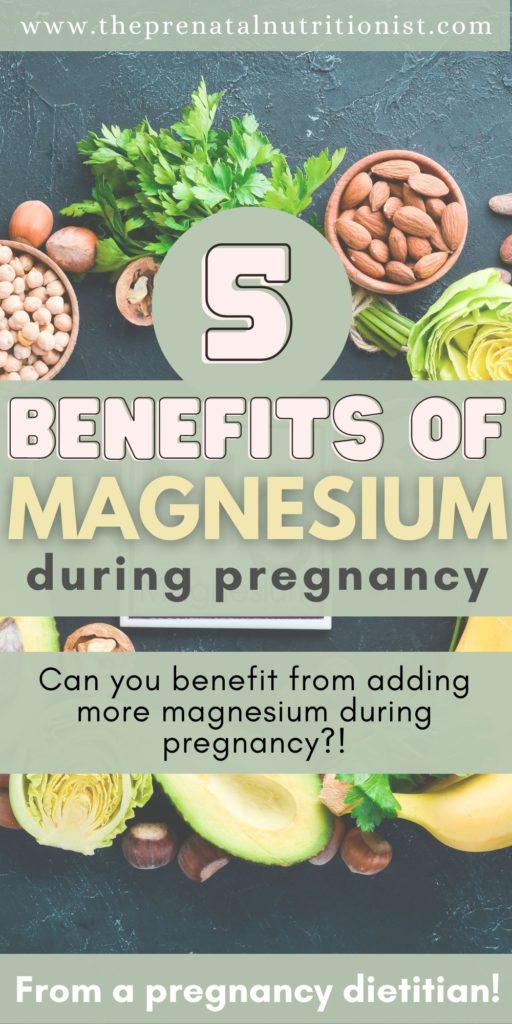
Benefits Of Magnesium During Pregnancy
- Might help reduce pregnancy complications, such as preeclampsia, gestational diabetes, and low birth weight.
- Supports bone health for mom and bone health and development for baby
- Can help with muscle and nerve function or leg cramps, which are common during pregnancy
- May help you get a better night’s sleep
- Helps fight constipation
- May potentially play a role in the prevention of postpartum depression and anxiety
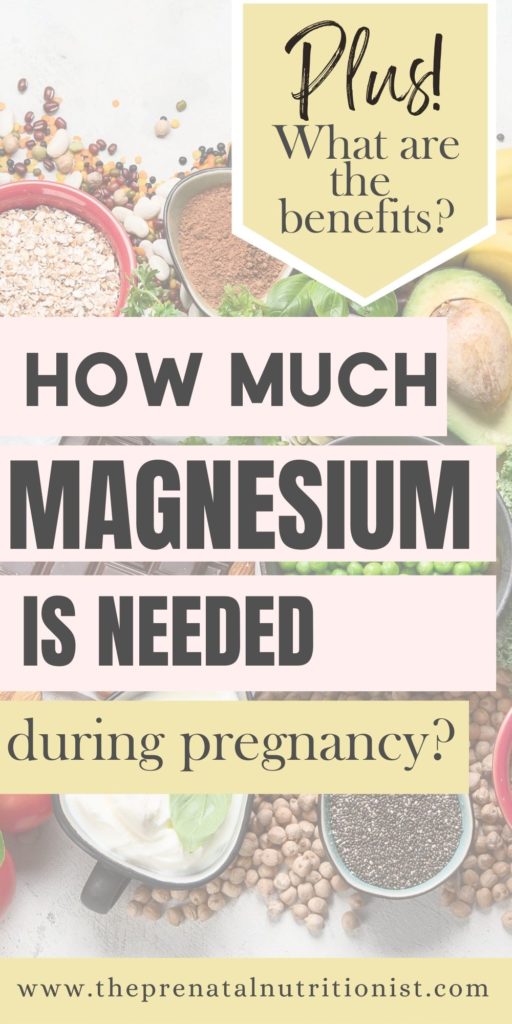
How Much Magnesium Does A Pregnant Woman Need?
Most people, especially during pregnancy, are deficient in magnesium, so you could likely benefit from increasing your magnesium intake and, at the least, finding a prenatal vitamin with magnesium.
Pregnant women need between 350 to 400 milligrams of magnesium daily, depending on age. It’s possible for pregnant women to meet their daily requirements with a whole food, diverse diet with plenty of magnesium-rich foods.
If you aren’t getting enough magnesium from your diet (or experiencing any of the symptoms above), your doctor or dietitian might recommend taking a magnesium supplement. Consult with your healthcare team for the amount of magnesium to supplement with.
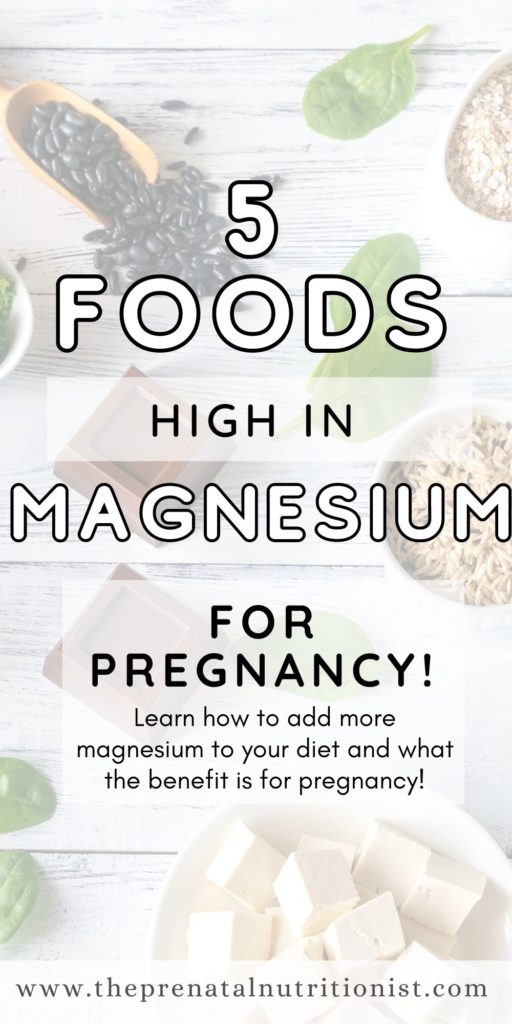
Magnesium-Rich Foods For Pregnancy
Pumpkin Seeds
It only takes a small handful of pumpkin seeds to boost your magnesium intake. Just one ounce of pumpkin seeds provides 78 mg of magnesium.
Pumpkin seeds are also a good source of zinc, plant-based omega-3 fatty acids, vitamin A, non-heme iron, and copper.
There are several easy and delicious ways to enjoy pumpkin seeds. First, I recommend roasting them in the oven with your favorite seasoning. Then, you can scatter them over a salad or enjoy them as a healthy pregnancy snack. More healthy pregnancy snack ideas are HERE.
Chia Seeds
Chia seeds are another great source of magnesium and many other nutrients that are especially important during pregnancy. One ounce of chia seeds provides 95 mg of magnesium.
Chia seeds provide plant-based omega-3 fatty acids and antioxidants, non-dairy calcium, phosphorus, vitamin A, manganese, copper, zinc, non-heme iron, and potassium.
Almonds
Almonds are a great food for pregnant women. They’re a great source of non-dairy calcium, rich in fiber, and contain monounsaturated and polyunsaturated fats. All of these nutrients support a healthy pregnancy. Almonds may even help with morning sickness when dealing with meat and protein aversions!
One ounce of almonds, or about 23 whole almonds, offers 76 mg of magnesium. Add almonds to a homemade snack mix or spread some almond butter on a slice of whole-grain toast.
Cashews
Cashews are also a good source of magnesium. One ounce of these nutrient-dense nuts provides 83 mg of magnesium.
Like almonds, cashews provide other essential nutrients like dietary fiber, zinc, calcium, and phosphorus. So a homemade snack mix containing roasted almonds and cashews would make a super healthy pregnancy on-the-go snack.
Spinach
I could go on and on about the benefits of leafy greens. Spinach, in particular, is a great pregnancy food. One cup of cooked spinach contains about 157 mg of magnesium.
Spinach is also a great vitamin K, A, manganese, and folate source. You can add spinach to any meal for an easy nutrient boost.
Best Magnesium Supplements For Pregnancy
Let’s review some oral magnesium supplementation options that are safe for pregnancy. If you are experiencing a magnesium deficiency, you may also want to consider a topical magnesium such as magnesium salts, magnesium lotions, and magnesium-containing deodorant.
Too much magnesium from food does not pose any risks, but you can supplement with too much, causing diarrhea, nausea, and abdominal cramping.
Thorne Magnesium Citrate or Magnesium Bisglycinate Powder
Thorne is a well-respected brand that uses third-party testing for its supplements. They offer two excellent magnesium supplement options for times when a magnesium supplement is indicated.
The magnesium citrate comes in capsule form, whereas the magnesium bis-glycinate is a powder easily mixed into water. You can view my full Thorne supplement dispensary here.
Pure Encapsulations Magnesium (Glycinate)
Pure Encapsulations Magnesium (Glycinate) is a popular, top-rated magnesium supplement. One capsule provides 120 mg of magnesium glycinate. There are 90 capsules in each bottle.
The magnesium supplement from Pure Encapsulations is free from wheat, eggs, tree nuts, peanuts, gluten, artificial flavors, colors, and sweeteners. I also appreciate that Pure Encapsulations is a third-party tested brand.
Seeking Health Chewable Magnesium Malate
Lastly, seeking Health offers a chewable magnesium malate supplement for those that prefer to skip a capsule or powder. There are 100 chewables per bottle at a great price. It’s also free from all the top 8 allergens. There are 100 mg of magnesium malate per chewable (one serving).
Like the other two brands listed above, Seeking Health uses third-party testing and tests for their supplements’ purity and quality.
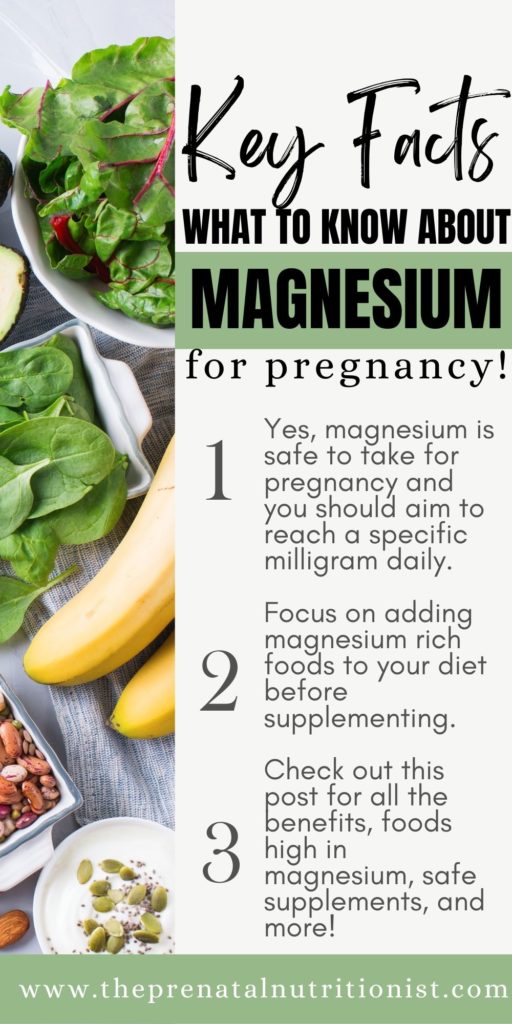
Taking magnesium during pregnancy can help you reach your nutrient goals when diet alone isn’t enough or specific symptoms are present.
As always, I recommend talking to your doctor or dietitian before you begin any new supplement during pregnancy. However, a magnesium supplement might be a good option for your pregnancy outcome if you think you aren’t getting enough of this essential nutrient from your diet or experiencing the above symptoms.
To read more about other popular topics for pregnant people, check out my post on coconut water in pregnancy or my write-up on whether protein bars are safe during pregnancy. Or head over to the blog for even more information on healthy eating during pregnancy.
Join The Prenatal Nutrition Library to access the best online resource for supporting your pregnancy with good nutrition. It’s your home for the answers to all your frequently asked pregnancy nutrition questions, delicious and healthy trimester meal plans, and more! Check it out today!
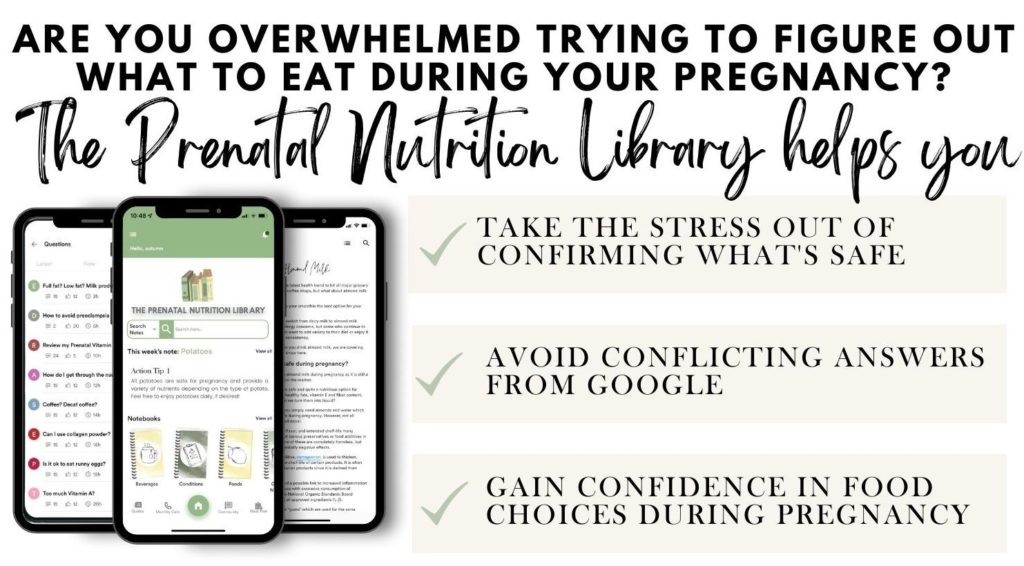
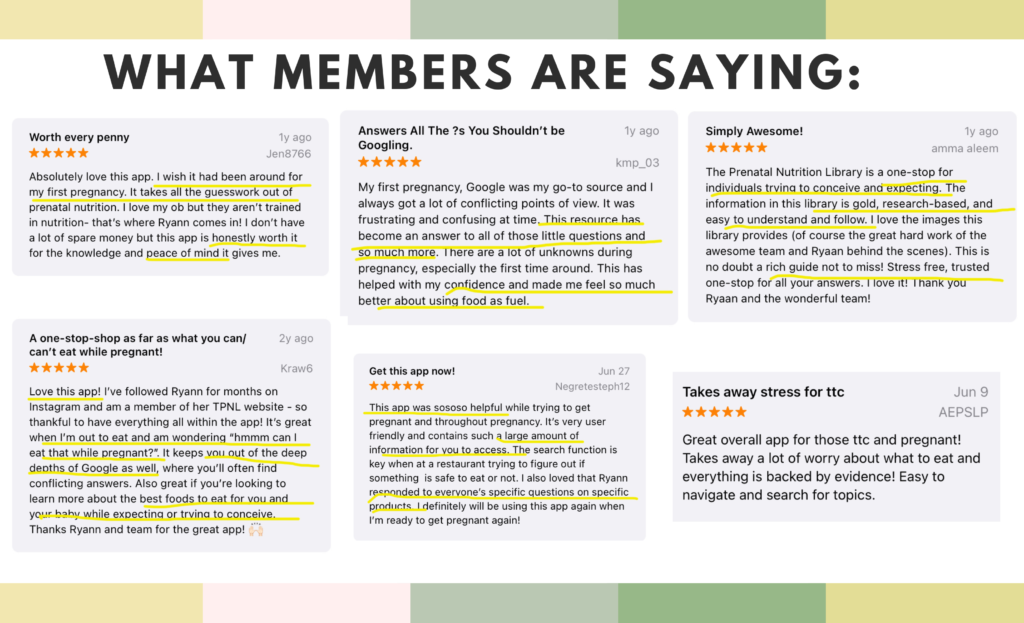
This post contains affiliate links. At no cost to you, I will make a small commission if you click and purchase anything.










